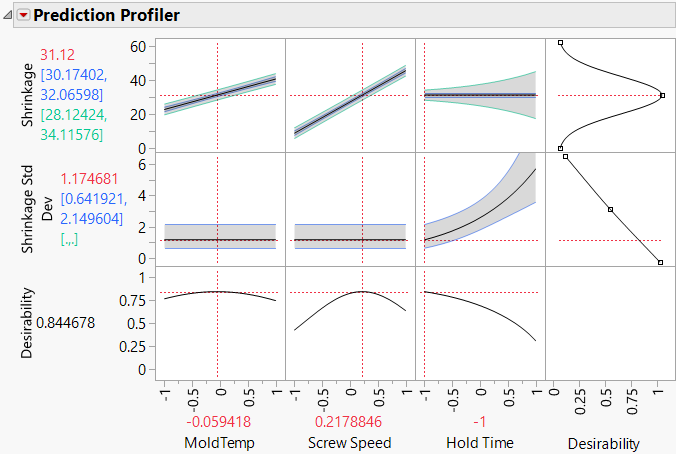Example of Profiling a Fitted Loglinear Variance Model
This example demonstrates the use of the Prediction Profiler to find factor settings that achieve a specific target for the response while minimizing variance. Fit the models and then use the Profiler to match a target value for a mean and to minimize variance.
1. Select Help > Sample Data Folder and open InjectionMolding.jmp.
2. Select Analyze > Fit Model.
Since the variables in the data table have been assigned preselected roles, the analysis runs automatically.
3. Click the Loglinear Variance Fit red triangle and select Profilers > Profiler.
4. Click the Prediction Profiler red triangle and select Optimization and Desirability > Set Desirabilities.
5. In the Response Goal window that appears, change Maximize to Match Target.
6. Click OK.
7. In the second Response Goal window, click OK.
8. Click the Prediction Profiler red triangle and select Optimization and Desirability > Maximize Desirability.
9. Click the Prediction Profiler red triangle and select Prediction Intervals.
Note: Your results might vary due to random starting values in the optimization process.
Figure 11.7 Profiler to Match Target and Minimize Variance with Prediction Intervals
One of the best ways to see the relationship between the mean and the variance (both modeled with the LogVariance personality) is through looking at the individual prediction confidence intervals about the mean. Regular confidence intervals (those shown by default in the Profiler) do not show information about the variance model as well as individual prediction confidence intervals do. Prediction intervals show both the mean and variance model in one graph.
If Y is the modeled response, and you want a prediction interval for a new observation at xn, then:

where:
 is the variance for the individual prediction at xn
is the variance for the individual prediction at xn
 is the variance of the distribution of Y at xn
is the variance of the distribution of Y at xn
 is the variance of the sampling distribution of
is the variance of the sampling distribution of  , and is also the variance for the mean.
, and is also the variance for the mean.
Because the variance of the individual prediction contains the variance of the distribution of Y, the effects of the changing variance for Y can be seen. Not only are the individual prediction intervals wider, but they can change shape with a change in the variance effects.
